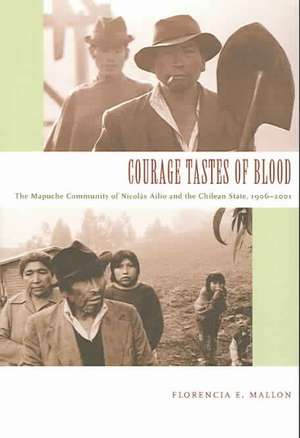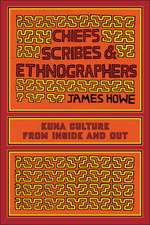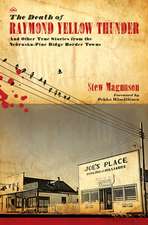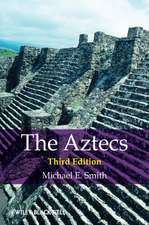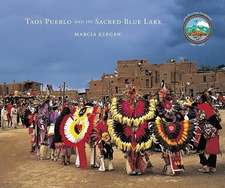Courage Tastes of Blood – The Mapuche Community of Nicolás Ailío and the Chilean State, 1906–2001: Radical Perspectives
Autor Florencia E. Mallonen Limba Engleză Paperback – 27 oct 2005
Din seria Radical Perspectives
-
 Preț: 215.97 lei
Preț: 215.97 lei -
 Preț: 202.18 lei
Preț: 202.18 lei -
 Preț: 193.33 lei
Preț: 193.33 lei -
 Preț: 265.20 lei
Preț: 265.20 lei -
 Preț: 302.74 lei
Preț: 302.74 lei -
 Preț: 308.90 lei
Preț: 308.90 lei -
 Preț: 263.29 lei
Preț: 263.29 lei -
 Preț: 302.36 lei
Preț: 302.36 lei -
 Preț: 303.11 lei
Preț: 303.11 lei - 23%
 Preț: 887.39 lei
Preț: 887.39 lei -
 Preț: 299.29 lei
Preț: 299.29 lei -
 Preț: 306.77 lei
Preț: 306.77 lei -
 Preț: 263.29 lei
Preț: 263.29 lei -
 Preț: 262.70 lei
Preț: 262.70 lei -
 Preț: 229.20 lei
Preț: 229.20 lei -
 Preț: 301.20 lei
Preț: 301.20 lei -
 Preț: 262.70 lei
Preț: 262.70 lei -
 Preț: 306.99 lei
Preț: 306.99 lei -
 Preț: 265.20 lei
Preț: 265.20 lei -
 Preț: 302.96 lei
Preț: 302.96 lei -
 Preț: 303.88 lei
Preț: 303.88 lei - 9%
 Preț: 668.08 lei
Preț: 668.08 lei -
 Preț: 253.07 lei
Preț: 253.07 lei
Preț: 266.18 lei
Nou
Puncte Express: 399
Preț estimativ în valută:
50.93€ • 53.31$ • 42.39£
50.93€ • 53.31$ • 42.39£
Carte tipărită la comandă
Livrare economică 31 martie-14 aprilie
Preluare comenzi: 021 569.72.76
Specificații
ISBN-13: 9780822335740
ISBN-10: 0822335743
Pagini: 344
Ilustrații: 28 photographs, 4 maps, 1 figure
Dimensiuni: 156 x 235 x 15 mm
Greutate: 0.5 kg
Editura: MD – Duke University Press
Seria Radical Perspectives
ISBN-10: 0822335743
Pagini: 344
Ilustrații: 28 photographs, 4 maps, 1 figure
Dimensiuni: 156 x 235 x 15 mm
Greutate: 0.5 kg
Editura: MD – Duke University Press
Seria Radical Perspectives
Recenzii
"Courage Tastes of Blood explores how ordinary, marginalized indigenous peoples in Chile construct historical memory in small, discontinuous steps, a process which enables them to sustain a politics of difference in a world where globalization threatens to further homogenize diversity in the name of economic progress and stability. Florencia E. Mallon highlights the importance of everyday practices in understanding oral sources, and, in so doing, she challenges readers to reconsider the preconceptions of history as a field of knowledge that reproduces the rationality of power. This is a bold, fascinating, and highly original contribution to our understanding of indigenous lives, repression in Chile, and racism, and it provides a methodological lesson in rethinking fields of inquiry from the perspective of alternative knowledge producers.--Arturo Arias, past president of the Latin American Studies Association"Florencia E. Mallon gives history a human face. Her description of a Mapuche communitys struggle to recover land rights previously lost in extremely adverse conditions underscores the promise of historical work to go way beyond the cold, distanced analysis of things past. The Mapuche navigate the pages of Courage Tastes of Blood with the sturdy competence of devoted craftsmen carving their own destiny.--Alcida Rita Ramos, author of Indigenism: Ethnic Politics in Brazil"Florencia E. Mallon combines a historians sensitivity to context and an ethnographers attention to cultural description, capturing the everydayness of life in the midst of rapid social transformation. While focusing on one Mapuche community, she provides insights into larger histories of social mobilization, state formation, political violence, and community identity.--Greg Grandin, author of The Last Colonial Massacre: Latin America in the Cold War"[A] unique history of modern Chile from the point of view of a Mapuche community. . . Mallon offers an original contribution to the understanding of indigenous politics and memory, negotiations between indigenous people and the state, and the production of history from the margins.--Ana Mariella Bacigalupo, American Ethnologist"Mallon places herself at the center of the story, overtly acknowledging her own role in collecting and interpreting oral histories and archival documents. The dialogical method of writing a collective ethnography is an innovative methodology...Highly recommended. Upper division undergraduates and above. --M. Becker, Choice"Hats off to the editorial board of Duke University Press. Until now, there has beennothing like Florencia Mallons superb La sangre del copihue: La comunidad Mapuchede Nicolás Ailío y el Estado chileno, 1906-2001 (LOM Ediciones, Santiago,Chile, 2004) available to an English audience. This remarkable book combinesimpeccable scholarship, compelling drama, innovative methodology, and a topic ofutmost salience. Mallon presents a seemingly familiar story of the long MapucheIndian struggle for land, justice, and recognition. What sets this telling apart, however,is Mallons exquisitely detailed micro-history, taking us deeply into the individuallives and shared experiences of a single community. For nearly a century,the residents of Nicolás Ailío have been entangled in a dramatic contestation over45 hectares of disputed land. In Mallons deft hands, this small, local conflict offersa point of departure for an ambitious, richly layered analysis of Chiles troubledhistory of land usurpation, indigenous resistance, democratic promise andfailure, the quest for reconciliation, and the perpetual struggle to define Indian andChilean identity."--Revista Europea de Estudios Latinoamericanos y del Caribe 84, abril de 2008
"Courage Tastes of Blood explores how ordinary, marginalized indigenous peoples in Chile construct historical memory in small, discontinuous steps, a process which enables them to sustain a 'politics of difference' in a world where globalization threatens to further homogenize diversity in the name of economic progress and stability. Florencia E. Mallon highlights the importance of everyday practices in understanding oral sources, and, in so doing, she challenges readers to reconsider the preconceptions of history as a field of knowledge that reproduces the rationality of power. This is a bold, fascinating, and highly original contribution to our understanding of indigenous lives, repression in Chile, and racism, and it provides a methodological lesson in rethinking fields of inquiry from the perspective of alternative knowledge producers."--Arturo Arias, past president of the Latin American Studies Association "Florencia E. Mallon gives history a human face. Her description of a Mapuche community's struggle to recover land rights previously lost in extremely adverse conditions underscores the promise of historical work to go way beyond the cold, distanced analysis of things past. The Mapuche navigate the pages of Courage Tastes of Blood with the sturdy competence of devoted craftsmen carving their own destiny."--Alcida Rita Ramos, author of Indigenism: Ethnic Politics in Brazil "Florencia E. Mallon combines a historian's sensitivity to context and an ethnographer's attention to cultural description, capturing the everydayness of life in the midst of rapid social transformation. While focusing on one Mapuche community, she provides insights into larger histories of social mobilization, state formation, political violence, and community identity."--Greg Grandin, author of The Last Colonial Massacre: Latin America in the Cold War "[A] unique history of modern Chile from the point of view of a Mapuche community... Mallon offers an original contribution to the understanding of indigenous politics and memory, negotiations between indigenous people and the state, and the production of history from the margins."--Ana Mariella Bacigalupo, American Ethnologist "Mallon places herself at the center of the story, overtly acknowledging her own role in collecting and interpreting oral histories and archival documents. The dialogical method of writing a collective ethnography is an innovative methodology...Highly recommended. Upper division undergraduates and above." --M. Becker, Choice "Hats off to the editorial board of Duke University Press. Until now, there has been nothing like Florencia Mallon's superb La sangre del copihue: La comunidad Mapuche de Nicolas Ailio y el Estado chileno, 1906-2001 (LOM Ediciones, Santiago, Chile, 2004) available to an English audience. This remarkable book combines impeccable scholarship, compelling drama, innovative methodology, and a topic of utmost salience. Mallon presents a seemingly familiar story of the long Mapuche Indian struggle for land, justice, and recognition. What sets this telling apart, however, is Mallon's exquisitely detailed micro-history, taking us deeply into the individual lives and shared experiences of a single community. For nearly a century, the residents of Nicolas Ailio have been entangled in a dramatic contestation over 45 hectares of disputed land. In Mallon's deft hands, this small, local conflict offers a point of departure for an ambitious, richly layered analysis of Chile's troubled history of land usurpation, indigenous resistance, democratic promise and failure, the quest for reconciliation, and the perpetual struggle to define Indian and Chilean identity."-- Revista Europea de Estudios Latinoamericanos y del Caribe 84, abril de 2008
"Courage Tastes of Blood explores how ordinary, marginalized indigenous peoples in Chile construct historical memory in small, discontinuous steps, a process which enables them to sustain a 'politics of difference' in a world where globalization threatens to further homogenize diversity in the name of economic progress and stability. Florencia E. Mallon highlights the importance of everyday practices in understanding oral sources, and, in so doing, she challenges readers to reconsider the preconceptions of history as a field of knowledge that reproduces the rationality of power. This is a bold, fascinating, and highly original contribution to our understanding of indigenous lives, repression in Chile, and racism, and it provides a methodological lesson in rethinking fields of inquiry from the perspective of alternative knowledge producers."--Arturo Arias, past president of the Latin American Studies Association "Florencia E. Mallon gives history a human face. Her description of a Mapuche community's struggle to recover land rights previously lost in extremely adverse conditions underscores the promise of historical work to go way beyond the cold, distanced analysis of things past. The Mapuche navigate the pages of Courage Tastes of Blood with the sturdy competence of devoted craftsmen carving their own destiny."--Alcida Rita Ramos, author of Indigenism: Ethnic Politics in Brazil "Florencia E. Mallon combines a historian's sensitivity to context and an ethnographer's attention to cultural description, capturing the everydayness of life in the midst of rapid social transformation. While focusing on one Mapuche community, she provides insights into larger histories of social mobilization, state formation, political violence, and community identity."--Greg Grandin, author of The Last Colonial Massacre: Latin America in the Cold War "[A] unique history of modern Chile from the point of view of a Mapuche community... Mallon offers an original contribution to the understanding of indigenous politics and memory, negotiations between indigenous people and the state, and the production of history from the margins."--Ana Mariella Bacigalupo, American Ethnologist "Mallon places herself at the center of the story, overtly acknowledging her own role in collecting and interpreting oral histories and archival documents. The dialogical method of writing a collective ethnography is an innovative methodology...Highly recommended. Upper division undergraduates and above." --M. Becker, Choice "Hats off to the editorial board of Duke University Press. Until now, there has been nothing like Florencia Mallon's superb La sangre del copihue: La comunidad Mapuche de Nicolas Ailio y el Estado chileno, 1906-2001 (LOM Ediciones, Santiago, Chile, 2004) available to an English audience. This remarkable book combines impeccable scholarship, compelling drama, innovative methodology, and a topic of utmost salience. Mallon presents a seemingly familiar story of the long Mapuche Indian struggle for land, justice, and recognition. What sets this telling apart, however, is Mallon's exquisitely detailed micro-history, taking us deeply into the individual lives and shared experiences of a single community. For nearly a century, the residents of Nicolas Ailio have been entangled in a dramatic contestation over 45 hectares of disputed land. In Mallon's deft hands, this small, local conflict offers a point of departure for an ambitious, richly layered analysis of Chile's troubled history of land usurpation, indigenous resistance, democratic promise and failure, the quest for reconciliation, and the perpetual struggle to define Indian and Chilean identity."-- Revista Europea de Estudios Latinoamericanos y del Caribe 84, abril de 2008
Notă biografică
Textul de pe ultima copertă
"Florencia E. Mallon combines a historian's sensitivity to context and an ethnographer's attention to cultural description, capturing the everydayness of life in the midst of rapid social transformation. While focusing on one Mapuche community, she provides insights into larger histories of social mobilization, state formation, political violence, and community identity."--Greg Grandin, author of "The Last Colonial Massacre: Latin America in the Cold War"
Descriere
Follows the history of an indigenous community in southern Chile across the 20th century, using oral history and archival material to analyze the shifting relationship between the Mapuche people and the Chilean state
